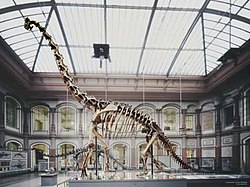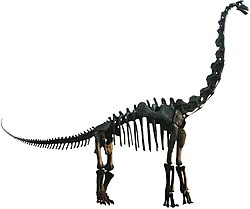Giraffatitan
Giraffatitan ("giraffe titan") is a genus of sauropod dinosaurs. It lived during the Upper Jurassic, about 140 million years ago.[2] It was related to Brachiosaurus, and was one of the largest animals known to have walked the Earth.
| Giraffatitan Temporal range: Upper Jurassic
150–145 mya | |
|---|---|

| |
| Mounted skeleton, Natural History Museum, Berlin | |
| Scientific classification | |
| Unrecognized taxon (fix): | Giraffatitan |
| Type species | |
| †Brachiosaurus brancai | |
| Synonyms | |
| |
Giraffatitans were about 23-metre (75 ft) long and weighed about 40 tonnes (88,000 lb). They had very long necks. They were obviously adapted for feeding on tall conifers. These were the main trees in the Jurassic forests. They lived in what is now Tanzania.[3]
The specimen was first named as an African species of Brachiosaurus (B. brancai) in 1914.[1] In 1991, George Olshevsky said there were enough differences to make its own genus, creating Giraffatitan.[4]
Size
Several giant titanosaurians appear to surpass Giraffatitan in sheer mass. However, Giraffatitan and Brachiosaurus are still the largest brachiosaurid sauropods known from relatively complete material.
All size estimates for Giraffatitan are based on the skeleton mounted in Berlin, which is partly constructed from authentic bones. These were largely taken from specimen HMN SII, a subadult individual between 21.8–22.46 metres (71.5–73.7 ft) in length and about twelve meters (forty feet) tall.[5]
Giraffatitan Media
A hindlimb during excavation in the Tendaguru in Lindi Region
Porters carrying a large bone at the Tendaguru
Foreman Boheti bin Amrani preparing a large rib
Diagram incorporating bones of both Brachiosaurus and Giraffatitan, by William Diller Matthew, 1915
References
| Wikimedia Commons has media related to Lua error in Module:Commons_link at line 62: attempt to index field 'wikibase' (a nil value).. |
- ↑ 1.0 1.1 1.2 Janensch W. 1914. Übersicht über der Wirbeltierfauna der Tendaguru-Schichten nebst einer kurzen Charakterisierung der neu aufgeführten Arten von Sauropoden. Archiv für Biontologie, 3 (1): 81–110.
- ↑ Potter, Christopher 2010. You are here: a portable history of the universe (2009). You Are Here: A Portable History of the Universe. HarperCollins. p. 26. ISBN 978-0061137877.
- ↑ Paul, Gregory S. 2010. The Princeton field guide to dinosaurs. (10 October 2010). The Princeton Field Guide to Dinosaurs. Princeton University Press. ISBN 978-0691137209.
- ↑ Glut D.F. 1997. Dinosaurs: the encyclopedia (July 1997). "Brachiosaurus". Dinosaurs: The Encyclopedia. McFarland. p. 218. ISBN 0-89950-917-7.
- ↑ Mazzetta, G.V.; et al. (2004). "Giants and Bizarres: body size of some southern South American Cretaceous dinosaurs". Historical Biology. 16 (2–4): 1–13. CiteSeerX 10.1.1.694.1650. doi:10.1080/08912960410001715132. S2CID 56028251.








